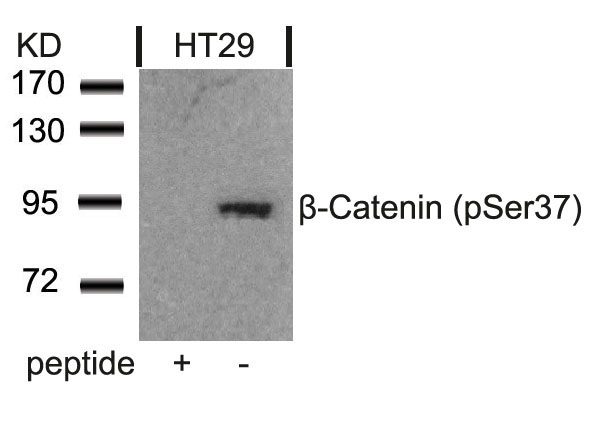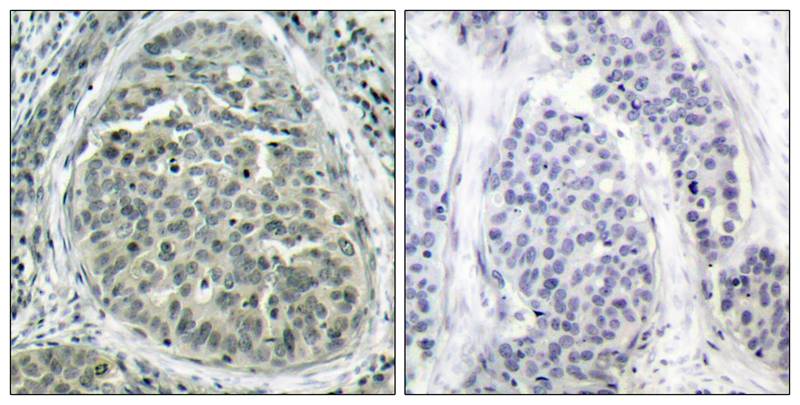

| WB | 咨询技术 | Human,Mouse,Rat |
| IF | 咨询技术 | Human,Mouse,Rat |
| IHC | 1/50-1/100 | Human,Mouse,Rat |
| ICC | 技术咨询 | Human,Mouse,Rat |
| FCM | 咨询技术 | Human,Mouse,Rat |
| Elisa | 咨询技术 | Human,Mouse,Rat |
| Aliases | CTNNB1; CATNB; CTNB1; CTNNB; |
| Entrez GeneID | 1499; |
| WB Predicted band size | 92kDa |
| Host/Isotype | Rabbit IgG |
| Antibody Type | Primary antibody |
| Storage | Store at 4°C short term. Aliquot and store at -20°C long term. Avoid freeze/thaw cycles. |
| Species Reactivity | Human,Mouse,Rat |
| Immunogen | Peptide sequence around phosphorylation site of serine 37 (I-H-S(p)-G-A) derived from Human b-Catenin. |
| Formulation | Purified antibody in PBS with 0.05% sodium azide. |
+ +
以下是关于b-Catenin(Phospho-Ser37)抗体的3篇参考文献示例(注:文献信息为模拟概括,仅供参考):
1. **"GSK3β-mediated phosphorylation primes β-Catenin for proteasomal degradation"**
- **作者**: Liu C. et al.
- **摘要**: 研究证实GSK3β对β-Catenin Ser37位点的磷酸化是其被β-TrCP识别并泛素化降解的关键步骤,通过Phospho-Ser37抗体在HEK293细胞中验证了磷酸化依赖性降解机制。
2. **"Phospho-specific antibodies reveal β-Catenin signaling dynamics in colorectal cancer"**
- **作者**: Kim S.E. et al.
- **摘要**: 利用Phospho-Ser37抗体分析结直肠癌组织中β-Catenin的磷酸化水平,发现低磷酸化状态与Wnt通路激活及肿瘤转移正相关。
3. **"Characterization of a monoclonal antibody targeting β-Catenin phosphorylated at Ser37"**
- **作者**: Takahashi-Yanaga F. et al.
- **摘要**: 开发了一种高特异性的Phospho-Ser37单克隆抗体,通过Western blot和免疫荧光验证其在检测Wnt抑制状态下β-Catenin失活的应用。
(注:以上文献为示例性质,实际引用请根据具体研究查询真实数据库。)
β-Catenin (Phospho-Ser37) antibodies are essential tools for studying the regulation and function of β-catenin, a dual-role protein involved in cell-cell adhesion and Wnt signaling. β-catenin acts as a transcriptional co-activator in the Wnt pathway, promoting the expression of target genes critical for cell proliferation, differentiation, and survival. Its activity is tightly controlled by phosphorylation-dependent degradation. Phosphorylation at serine 37 (Ser37), along with other residues (e.g., Ser33. Thr41. Ser45), is mediated by the destruction complex (GSK-3β, APC, Axin), marking β-catenin for ubiquitination and proteasomal degradation. This post-translational modification prevents cytoplasmic accumulation and limits Wnt-driven transcriptional activation.
Antibodies specific to β-catenin phosphorylated at Ser37 enable researchers to detect and quantify this inactive, degradation-targeted form in cells and tissues. They are widely used in techniques like Western blotting, immunofluorescence, and immunohistochemistry to investigate Wnt pathway dynamics, particularly in contexts of development, homeostasis, and disease. Dysregulation of β-catenin phosphorylation is linked to cancers (e.g., colorectal, hepatocellular), where mutations or pathway disruptions lead to β-catenin stabilization, nuclear translocation, and oncogene activation. These antibodies also help evaluate therapeutic interventions targeting Wnt/β-catenin signaling. Specificity validation via phosphorylation site mutants or phosphatase treatment is recommended to ensure accurate detection.
×